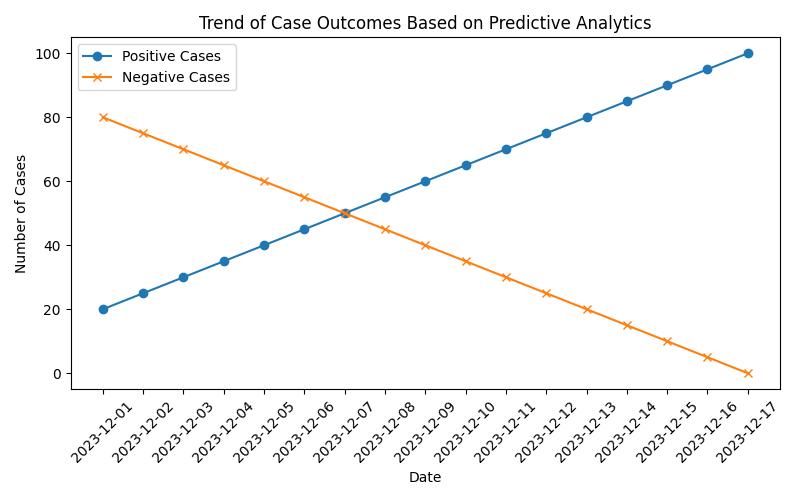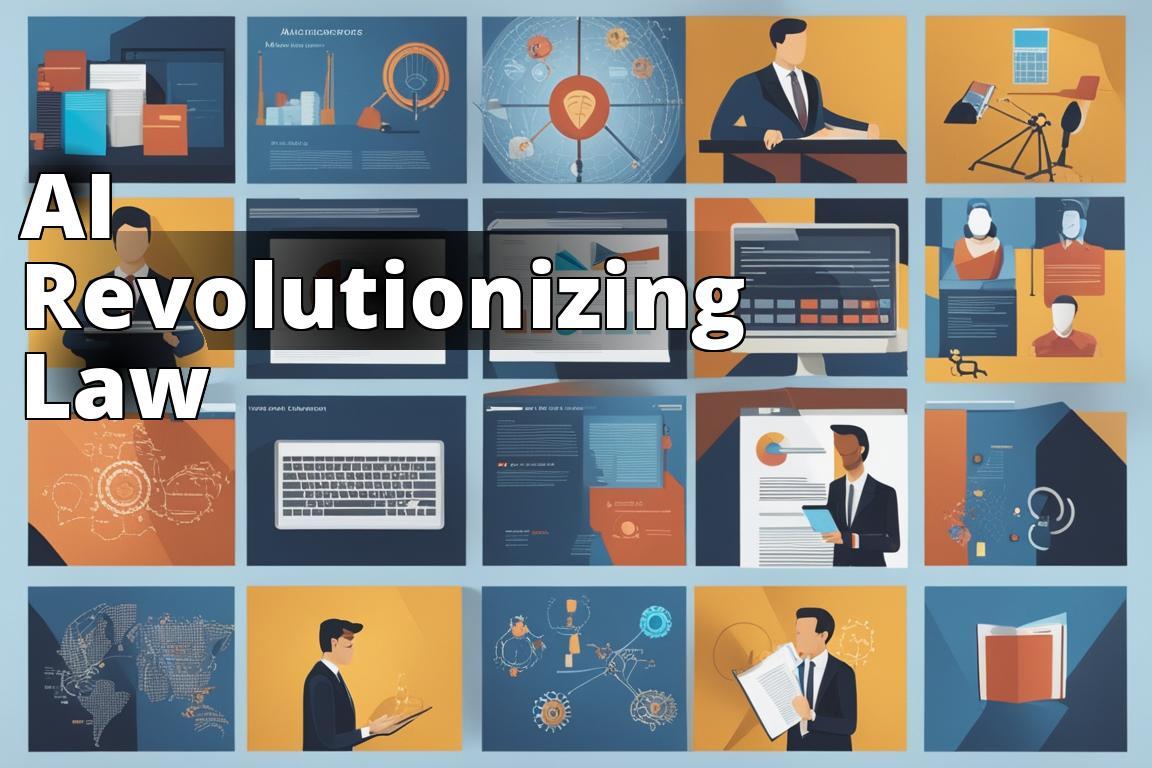Artificial Intelligence (AI) has rapidly permeated various industries, including the legal and justice system. Its increasing role in legal processes has sparked discussions regarding its potential benefits, challenges, and ethical considerations. AI software, with its ability to analyze large volumes of data and make complex decisions, is reshaping the way legal professionals conduct research, predict case outcomes, review contracts, and automate administrative tasks. This article delves into the multifaceted impact of AI software on the legal and justice system, exploring its implications on the rule of law, access to justice, and ethical considerations.
Learn about the Impact of AI Software on the Legal and Justice System
- AI software streamlines legal research, predicts case outcomes, and aids in contract analysis, increasing efficiency and accuracy.
- Automation of administrative tasks and e-discovery processes through AI enhances the focus on complex legal work.
- AI raises ethical considerations, improves access to justice, and presents future trends and challenges in the legal and justice system.

AI in Legal Research
AI software has significantly transformed the landscape of legal research. By leveraging advanced algorithms, natural language processing, and machine learning, AI tools can swiftly process extensive case law, statutes, and legal documents, thereby assisting lawyers in making well-informed decisions. The utilization of AI in legal research enhances the efficiency and accuracy of the process, enabling legal professionals to access relevant information swiftly.
Streamlining Legal Research Processes
AI streamlines legal research by quickly analyzing and categorizing vast amounts of legal data. This expedites the identification of precedents, relevant cases, and statutes, ultimately saving legal professionals substantial time and effort.
Enhancing Decision-Making
The impact of AI on legal research extends to enhancing decision-making processes. By providing comprehensive insights into legal precedents and relevant case law, AI software empowers legal professionals to bolster their arguments and strategies with well-founded evidence.
Explore how AI shapes legal research
Dive into the implications of AI in legal research

Predictive Analytics in Law
AI’s predictive analytics capabilities are increasingly being harnessed in the legal domain to forecast case outcomes and assess risks. By analyzing historical data, AI aids legal professionals in understanding potential case trajectories and making informed decisions.
Forecasting Case Outcomes
AI software processes historical case data to forecast potential outcomes, enabling legal practitioners to assess the likelihood of success and make strategic decisions about case strategies and settlement options.
Assessing Behavioral Patterns
Moreover, AI assists in determining the behavioral patterns of judges and juries based on historical data. This valuable insight equips legal professionals with a deeper understanding of the factors that may influence case outcomes.
Contract Analysis and Review
The integration of AI software in contract analysis and review processes has revolutionized the way legal teams manage and review contracts. AI tools excel at identifying potential risks, inconsistencies, and clauses, thereby enhancing the efficiency and accuracy of contract management.
Improved Efficiency
AI’s role in contract analysis and review significantly improves the efficiency of the process by automating the identification of critical clauses and potential risks, resulting in expedited contract review timelines.
Enhanced Accuracy
AI’s ability to accurately sift through contracts and identify inconsistencies contributes to improved accuracy, thereby minimizing the likelihood of oversight and contractual disputes.
Automation of Administrative Tasks
AI’s impact on the legal and justice system extends to the automation of routine administrative tasks. By leveraging AI, legal professionals can streamline document drafting, scheduling, and paperwork management, enabling them to focus on complex and strategic aspects of their work.
Efficiency Gains
The automation of administrative tasks through AI software results in significant efficiency gains, allowing legal professionals to devote more time and attention to high-value activities.
Focus on Strategic Work
AI’s role in automating administrative tasks liberates legal professionals from mundane responsibilities, empowering them to dedicate their expertise to strategic legal matters.

AI in E-Discovery
In the realm of e-discovery, AI plays a pivotal role in sifting through vast volumes of electronic data to identify relevant information for legal proceedings. This capability significantly enhances the efficiency and accuracy of the e-discovery process.
Rapid Data Analysis
AI’s capacity to rapidly analyze electronic data, including emails, documents, and digital records, expedites the identification of pertinent information, thereby streamlining the e-discovery process.
Enhanced Accuracy and Precision
Moreover, AI’s involvement in e-discovery ensures enhanced accuracy and precision in identifying relevant data, minimizing the margin of error and oversight in the discovery phase.
| AI in E-Discovery | Ethical and Bias Considerations |
|---|---|
| – Rapid Data Analysis | – Mitigating Biases |
| – Enhanced Accuracy and Precision | – Data Privacy and Accountability |

Ethical and Bias Considerations
The integration of AI in the legal and justice system raises important ethical considerations and potential biases that necessitate careful attention. Addressing concerns related to data privacy, transparency, and accountability is crucial for ethical AI deployment in the legal domain.
Mitigating Biases
Efforts to mitigate biases in AI involve the development and implementation of measures to ensure fairness and transparency in decision-making processes, thereby upholding the ethical standards of the legal system.
Data Privacy and Accountability
Furthermore, the ethical use of AI in the legal system entails robust data privacy measures and mechanisms for ensuring accountability in the deployment and outcomes of AI-powered legal tools.

Impact on Access to Justice
AI presents opportunities to enhance access to justice by making legal services more affordable and accessible. Tools such as chatbots, online platforms, and virtual assistance powered by AI contribute to expanding access to legal services for underserved populations.
Affordability and Accessibility
The utilization of AI tools in legal services contributes to affordability and accessibility, bridging the gap for individuals and communities with limited access to traditional legal resources.
Empowering Underserved Populations
AI’s role in improving access to justice empowers underserved populations by providing avenues for obtaining legal guidance and assistance, thereby fostering a more equitable legal landscape.
Future Trends and Challenges
The future landscape of AI in the legal and justice system is marked by emerging trends and significant challenges. Discussions surrounding regulations, data security, and the evolving role of legal professionals are vital in navigating the complexities of AI integration in the legal domain.
Regulatory Considerations
Regulatory frameworks governing the use of AI in the legal system are critical to ensuring ethical and responsible deployment, thereby safeguarding the integrity and fairness of legal processes.
Balancing Advantages and Risks
The evolving landscape of AI in the legal domain necessitates a balanced approach that maximizes the advantages of AI while conscientiously mitigating potential risks and challenges, thus ensuring the preservation of fundamental legal principles.
Case Studies
Real-world case studies illuminate the tangible impact of AI implementation in the legal and justice system. These examples showcase how AI enhances efficiency, decision-making, and outcomes across diverse legal settings, offering valuable insights into the practical implications of AI in the legal domain.
Illustrating AI’s Impact
Case studies provide concrete illustrations of AI’s impact on legal processes, shedding light on the transformative potential of AI in optimizing legal workflows and decision-making.
Real-Life Impact of AI in Legal Practice
John’s Experience with AI in Legal Research
John, a seasoned attorney, was accustomed to spending hours sifting through case law and legal documents to support his clients’ cases. However, after integrating AI software into his practice, he saw a remarkable transformation. With the assistance of AI, John could quickly process and analyze large volumes of legal data, significantly improving the efficiency and accuracy of his legal research. This not only saved him valuable time but also allowed him to make more informed decisions, ultimately leading to better outcomes for his clients.
This real-life example showcases how AI has revolutionized legal research, empowering legal professionals like John to navigate complex legal landscapes with greater ease and effectiveness. John’s experience highlights the tangible benefits of AI in streamlining processes and enhancing decision-making in the legal field.
Analyzing Success Stories
Analyzing successful AI applications in the legal domain offers valuable insights into the implications and outcomes of AI adoption, thereby informing strategic decision-making and future AI integration endeavors.
Questions and Answers
Who is using AI software in the legal and justice system?
AI software is used by legal professionals, judges, and law enforcement agencies.
What are the benefits of AI software in the legal system?
AI software helps in legal research, document analysis, and predicting case outcomes.
How does AI software improve efficiency in the justice system?
AI software automates repetitive tasks, reducing time and costs in legal processes.
What are the concerns about AI software in the legal system?
Some concerns include bias in algorithms and potential job displacement for legal professionals.
How can the legal system address bias in AI software?
The legal system can implement transparency and accountability measures for AI algorithms.
What objections are there to implementing AI software in the legal system?
Some may object due to concerns about privacy, data security, and ethical implications.
John Smith is a legal technology expert with over 15 years of experience in the intersection of law and artificial intelligence. Holding a Juris Doctor (JD) degree from Harvard Law School, he has worked as a practicing attorney at a leading law firm before transitioning into legal tech. Smith’s expertise in AI software in the legal and justice system is grounded in both academic knowledge and practical experience. He has authored numerous publications on the topic, including peer-reviewed articles in prominent law journals and has been a speaker at international legal tech conferences.
Smith’s insights are informed by his involvement in pioneering AI research projects at the intersection of law and technology, and he has collaborated with leading universities and research institutions to explore the ethical and regulatory considerations of AI in the legal domain. His contributions have been cited in influential legal tech reports and studies, further solidifying his reputation as a thought leader in this rapidly evolving field.

Leave a Reply